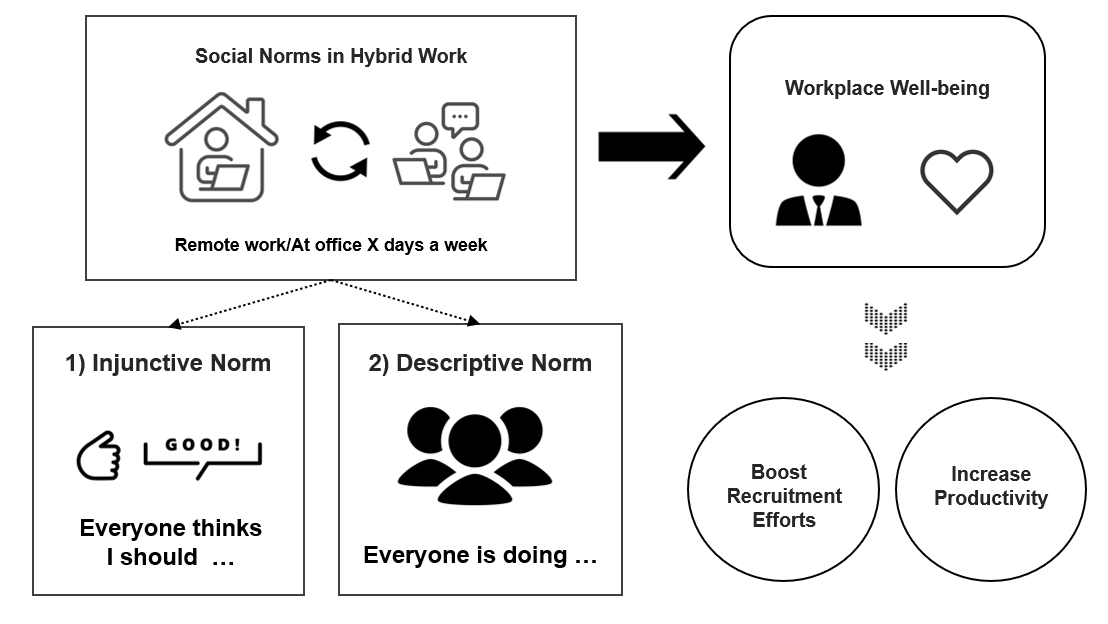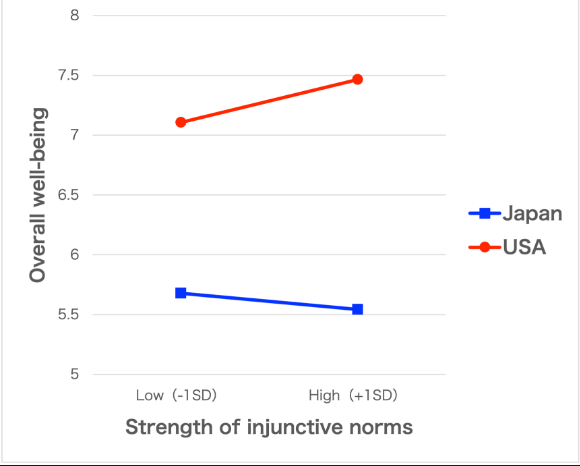Microsoft ends support for Internet Explorer on June 16, 2022.
We recommend using one of the browsers listed below.
- Microsoft Edge(Latest version)
- Mozilla Firefox(Latest version)
- Google Chrome(Latest version)
- Apple Safari(Latest version)
Please contact your browser provider for download and installation instructions.
May 13, 2024
NTT Corporation
Tokyo Institute of Technology
Japan-US comparative study on the well-being of hybrid workers
Americans want clear instructions on how to work, and Japanese don't
Tokyo — May 13, 2024 — NTT Corporation (NTT) and Tokyo Institute of Technology (Tokyo Tech) conducted a survey of hybrid workers in Japan and the United States to improve employee well-being in a hybrid work environment. In this study, we investigated the relationship between workplace social norms (Note 1) about hybrid work and the well-being of hybrid-working employees. We found that, among USA hybrid workers, those who experienced strong injunctive norms (Note 2) regarding hybrid work had higher workplace well-being. However, this was not the case among Japanese. We will continue our efforts to realize a sustainable, decentralized society through a deeper understanding of the challenges of employee well-being in remote and hybrid work. These findings will be presented at the 2024 ACM CHI Conference on Human Factors in Computing Systems (ACM CHI 2024), the premier international conference in the field of HCI, held in Honolulu, Hawaii, from May 11-16, 2024.
 Figure 1 Overview of the Study
Figure 1 Overview of the Study
1. Background of the study
Now that the COVID-19 outbreak is under control, hybrid work is increasing, which is expected to improve employee productivity and strengthen corporate recruitment capabilities. While hybrid work provides great flexibility in terms of when and where employees work, there are no established social norms about this work style, and the relationship between social norms and employee well-being in hybrid work may change depending on culture. Therefore, through a collaboration with NTT and Associate Professor Momoko Nakatani of Tokyo Institute of Technology (who started this research while at NTT), we investigated the relationship between social norms and employee well-being in hybrid work among hybrid workers in Japan and the United States.
2. Overview of the study
We conducted a Web questionnaire (1,000 Japanese, 1,000 American) and interviews (12 Japanese, 12 American) with hybrid workers between the ages of 18 and 64 living in Japan or the United States. We analyzed survey results using multiple regression analysis (Note 3) with workplace well-being as the dependent variable (Note 4), reference behavior, strength of injunctive norms, willingness to conform to injunctive norms, strength of descriptive norms (Note 5), and willingness to conform to descriptive norms as independent variables (Note 6), and country as a moderator variable (Note 7).
| Variable Name | Questions (answer choice) |
|---|---|
| Reference behavior | "My team members think that I should work under the following work arrangements", with the following mutually exclusive answer options: ("Come to the office every day", "Work remotely less than 1 day a week", "Work remotely 1—2 days a week", "Work remotely 3—4 days a week", and "Work remotely every day".) |
| Strength of injunctive norms | "How strongly do your team members think that you 'should follow' the work arrangements you selected in [the question on the reference behavior]?" Responses were provided on a seven-point Likert scale ranging from 1 = "They don't think I 'should follow' the work arrangements at all" to 7 = "They strongly think I 'should follow' the work arrangements". |
| Willingness to conform to injunctive norms | "I want to come to the office as often as my team members expect me to". This was measured on a seven-point Likert scale ranging from 1 = "Strongly disagree" to 7 = "Strongly agree". |
| Strength of descriptive norms | "Most of my team members come to the office with a similar frequency". This was answered on a different seven-point Likert scale ranging from 1 = "Strongly disagree" to 7 = "Strongly agree". |
| Willingness to conform to descriptive norms | "I want to come to the office about as often as other team members do". This was measured on a seven-point Likert scale ranging from 1 = "Strongly disagree" to 7 = "Strongly agree". |
| Overall well-being | Based on the workplace PERMA profiler3 |
Table Main variables used in the multiple regression model
3. Research findings
In both Japan and the United States, we found a significantly positive relationship between workplace well-being and willingness to conform to injunctive norms as well as with the strength of descriptive norms. This finding controlled for variations in age, gender, and job title, and was observed at a 5% significance level (Note 8). Furthermore, the interaction between the strength of the injunctive norm and country was significant. Simple slope analysis (Note 9) revealed that the relationship between the strength of the injunctive norm and well-being at work differed between Japan and the United States. Specifically, there was a significant positive relationship between the strength of injunctive norms and workplace well-being in the United States, but not in Japan. Interview results also indicated differing perceptions between countries regarding workplace norms: Japanese participants tended to view an injunctive norm of working remotely or being in the office a set number of days each week as a restriction on their freedom. Conversely, U.S. participants often saw this same norm as a positive basis for increasing their comfort at work. This may be due to differences in employment protection regulations between the two countries. In the United States such regulations are less stringent and so non-compliance with workplace instructions can increase one's risk of unemployment. Conversely, in Japan, where employment protection is stricter and the risk of unemployment is lower, personal interests and freedom may be prioritized over clear work directives.
 Figure 2 Simple Slope Analysis Results
Figure 2 Simple Slope Analysis Results
These findings suggest that there may be cultural differences in how social norms are perceived in hybrid work. In the United States, strengthening an injunctive norm that employees should work remotely or work at the office a certain number of days a week seems promising for improving employee well-being. However, this approach may not yield similar benefits in Japan.
4. Outlook
These results are expected to help improve employee well-being by appropriately shaping social norms in hybrid work. Going forward, we will contribute to the realization of a sustainable, decentralized society by gaining a deeper understanding of the challenges associated with employee well-being in remote and hybrid work.
●Terminology
Note (1)Social norms (in hybrid work): Standards of conduct regarding when and where to work.
Note (2)Injunctive norm (in hybrid work): The expectation set by supervisors or coworkers that employees should work remotely or be present in the office a specific number of days per week.
Note (3)Multiple regression analysis: A statistical method that examines the impact of several independent variables on a dependent variable.
Note (4)Dependent variable: The outcome variable whose changes are influenced by other variables (independent variables).
Note (5)Descriptive norm (in hybrid work): A norm that is formed by observing how supervisors and coworkers schedule their remote and in-office work days.
Note (6)Independent variable: A variable thought to affect the dependent variable.
Note (7)Moderator variable: A variable that thought to modify intensity or direction of the relationship between dependent and independent variables.
Note (8)Significance level: A threshold in statistical hypothesis testing that determines whether an observed effect is statistically significant, typically set at a probability (e.g., 5%), beyond which an effect is considered unlikely to have occurred by chance alone
Note (9)Simple slope analysis: A statistical analysis method that compares the relationship (slope) between a dependent variable and a specific independent variable under different conditions and evaluates the differences.
●References
1Akahori, Wataru, et al. "Impacts of the Strength and Conformity of Social Norms on Well-Being: A Mixed-Method Study Among Hybrid Workers in Japan." Proceedings of the 2023 CHI Conference on Human Factors in Computing Systems. 2023.
2Akahori, Wataru, et al. "The Impact of Social Norms on Hybrid Workers' Well-Being: A Cross-Cultural Comparison of Japan and the United States." Proceedings of the 2024 CHI Conference on Human Factors in Computing Systems. 2024.
3Kern ML. The Workplace PERMA Profiler. 2014.
(https://www.peggykern.org/uploads/5/6/6/7/56678211/workplace_perma_profiler_102014.pdf)
About NTT
NTT contributes to a sustainable society through the power of innovation. We are a leading global technology company providing services to consumers and businesses as a mobile operator, infrastructure, networks, applications, and consulting provider. Our offerings include digital business consulting, managed application services, workplace and cloud solutions, data center and edge computing, all supported by our deep global industry expertise. We are over $97B in revenue and 330,000 employees, with $3.6B in annual R&D investments. Our operations span across 80+ countries and regions, allowing us to serve clients in over 190 of them. We serve over 75% of Fortune Global 100 companies, thousands of other enterprise and government clients and millions of consumers.
Media contacts
NTT Service Innovation Laboratory Group
Public Relations
nttrd-pr@ml.ntt.com
Tokyo Institute of Technology
Public Relations Section, General Affairs Department
TEL: 03-5734-2975 FAX: 03-5734-3661
media@jim.titech.ac.jp
Information is current as of the date of issue of the individual press release.
Please be advised that information may be outdated after that point.
NTT STORY
WEB media that thinks about the future with NTT










